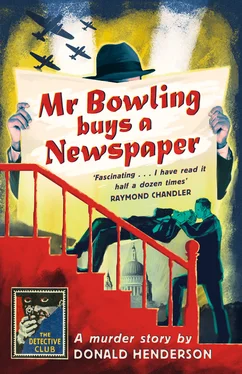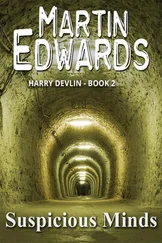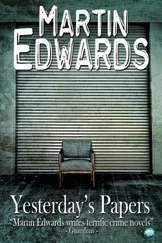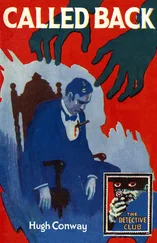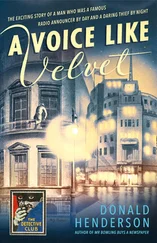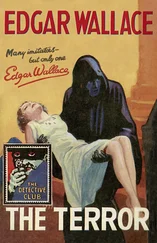‘Very well, sir,’ he said. ‘This is the lot, then.’
‘Yes. We only rented the house. I’ve got all I can think of in the list. Tots up to a jolly old four hundred and seventy-eight quid. And I’m not cheating you,’ he challenged.
He hadn’t cheated at all. He’d been warned all round: ‘They aren’t giving full value, you know. I should pile it up a bit. After all, remember you’ve got to wait till after the war—twenty years’ time!’
Roars of laughter.
When they wrote and asked him to accept two-thirds of his claim, he accepted at once, regardless of genuine loss, and also the loss of his music. Who cared? There was three hundred odd quid to look forward to after the bally old war, if we won, what, and if one lived through the night’s blitz. It was comfortable and one had never been fussy. Not for shillings and pence. It was the general idea of wide security, no more shabbiness, that was what one hungered for. A chap wanted something really substantial. No more of this bloody messing about. A really decent house, cottage perhaps, but in town, of course, you could have your huntin’, fishin’ and shootin’; a cottagey house in Knightsbridge or Belgravia, yes, Belgravia (what was left of it), or else a really decent flat. That was the ticket.
Lying flat on his divan, and plotting the demise of Mr Watson, he tried to work out how much money he must get before he could chuck the game. It was really easier to deal with one or two of his dear old lady clients, they were gullible and often fell for him, and they had pots of dough. But he was through with killing women. It had been frightful, one never thought of ugly detail. Watson was a bit of a sly customer, but that rather gave it a fillip and made it more sporting. To get him to sign the bally policy would be tricky enough, and then there was the office to think about. He would have to kill Watson the same day, or at any rate the next day, before the office could write and confirm things. And what were the office going to say? ‘You’re a lucky chap, aren’t you, Mr Bowling? Most astonishing bit of luck, what?’ Yes it wasn’t going to be too simple, was it. There were mugs about, but the office weren’t mugs, and Mr Watson wasn’t a mug. Had he had some gin, he would have thought queerly: ‘What does it matter, anyway? If I’m caught, I am! Who cares? … I’d rather like to be tried at the Old Bailey, honestly I would!’ He heard himself assuming gin and thinking this—and wondered why, and if he really meant it deep down. Men are queer things, he thought. He whispered it to the empty room. ‘Men are queer things.’ Then he whispered: ‘How much money shall I want, to make life real and worth while, to get stuff published, you can get these things done if you can dangle a bag of gold in the right quarters? How many must I kill?’ He was vague. He thought he’d better try and get hold of ten thousand pounds, but it sounded such a large sum, when you were more used to odd ten bob notes. Money bored him and never stayed in his mind for long. Detail bored him too. It ought to be easy for the police, he thought. If they can’t spot me, they’ll never spot anyone. He forgot about money and the details of Watson’s murder and suddenly thought: ‘By jove, can I remember all my compositions? What a sweat, writing them out again? I’m not as energetic as I was.’ Mr Bowling was thirty-seven. On the day he murdered Mr Watson in Fulham, he was thirty-eight. At Queenie’s that same night, when she asked him what sort of a birthday he had had, he roared with laughter. But she commented that his hands were clammy.
His hands went clammy when anything really moved or excited him; it was nothing. Nerves, you called it. On his wedding day they’d been clammy, and on his first day at his public school. When his father had died, a week before that fourteenth birthday, his hands had turned clammy while he thought how unfortunate it was, now he was stuck with his stepmother, who loathed him. There were two kinds of stepmothers—which people tended to forget—the brilliantly successful, and the sadistically cruel. She was one of the latter, or he would not have criticised her for loathing him. Well, they loathed each other, there was a polite and very strained tolerance. His father had been vague as his son still was, and had left no will, so stepmother collared everything. She was a woman of ‘ideas,’ so she let him carry on with the public school education, but she packed him off to live permanently with a relative who had a house where the school was. She wasn’t a bad old girl and was fond of the bottle. He infinitely preferred it to being with his stepmother. A severe and rather cruel snag was the enforced severance from his sister, they were genuinely fond of each other, and she was the only real affection in his life then or now. She ran away from home, married and died in childbirth, but she was as real to him now as if she was still bobbing about in the sordid world, especially when he had a go at the Moonlight Sonata. She’d stand by the piano, nearly enough, and he’d smile sadly at her and talk to her. Anyone coming in thought he was nuts. At school they thought he was nuts, he would do mad things, it was really in order to try and become popular, he had what was called an inferiority complex, a silly but useful phrase meaning he’d been kicked around as a child, mentally or physically, and hadn’t found his feet yet; perhaps he wouldn’t find his feet until he was forty or so, or at all, a chap like that naturally needed help. He needed love. It was no good sneering at it, it just showed your bally ignorance. Well, which was worse, to have that, or to have a superiority complex? The first suited creative art quite well—you could work ferociously in the dark, without an audience and in time maybe get away with it, emerging to find your complex gone; the second suited actors and politicians, you needed all the ego and conceit you could manage—and Heaven help you if you couldn’t get away with it then. At school he would do whatever the other chaps dared him, like climbing up the tower, or creeping past the Housemaster’s bedroom to tap on the servant’s door and moan: ‘ Whoooooo! ’ like a ghost. When she screamed, and he got caught and flogged, he showed his marks proudly and roared with laughter. He had rather a big head, like a tadpole, and rather a pink face. The other chaps admired him, in a way, he had guts, was generous when he had anything to be generous with, but they didn’t ‘like’ him. He didn’t make a friend. He was mostly to be seen sitting over a magazine, beaming round hopefully to see if he was in favour today or not. He was hopeless at maths, good at French, plucky at boxing and swimming and P.T., a good long-distance runner, and oddly religious. His music master took a fancy to him, but it was difficult because the old chap had peculiar pawing habits with boys. It was dangerous to be up there with the bellows. ‘Bowling,’ he liked saying, ‘you’re a nice boy, I like you. You should learn to play the organ.’ This he did, with easy agility, and giggling with laughter when he was kissed and fondled, it was all so silly. He composed an organ solo which was performed on Speech Day, a huge moment in his life. He beamed round at everyone that day with much success, and he heard Colton Major, a scraggy youth he had always hated, saying to his mother:
‘That’s Bowling, he wrote it, I was telling you, mater! He’s really rather decent!’
Later, in fun, he got hold of scraggy Colton in the bushes and put a hand behind his neck and turned his scraggy frame round. It was easy. He put his hand over Colton’s mouth, and rather close to his nose, and it was amusing to hear Colton’s smothered screams. They were more like squeals. His face turned a dusky red, and then very slightly black. He thought he’d better let go.
Читать дальше
